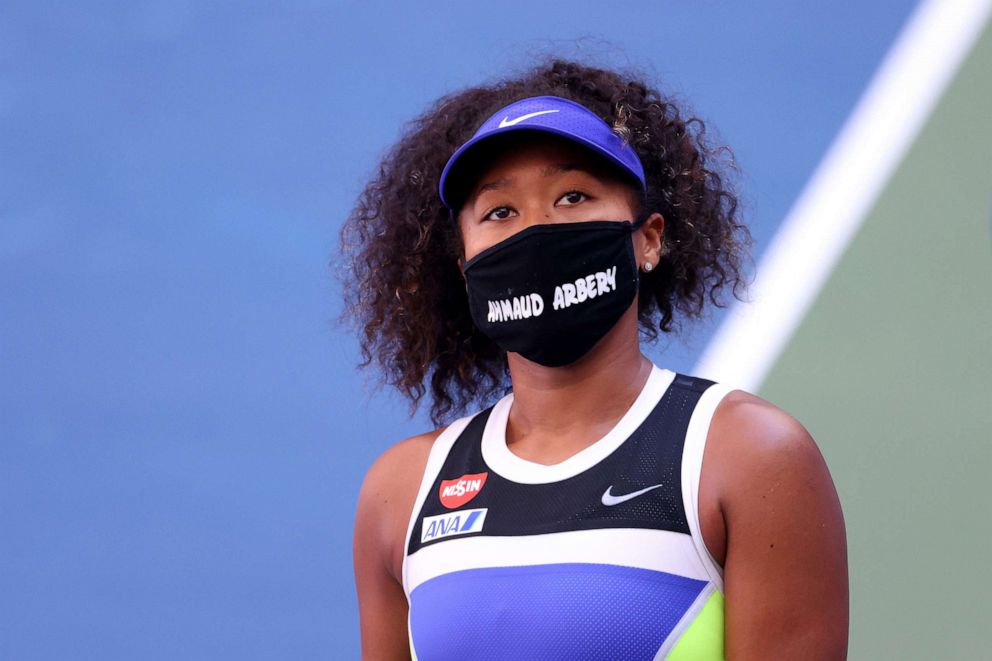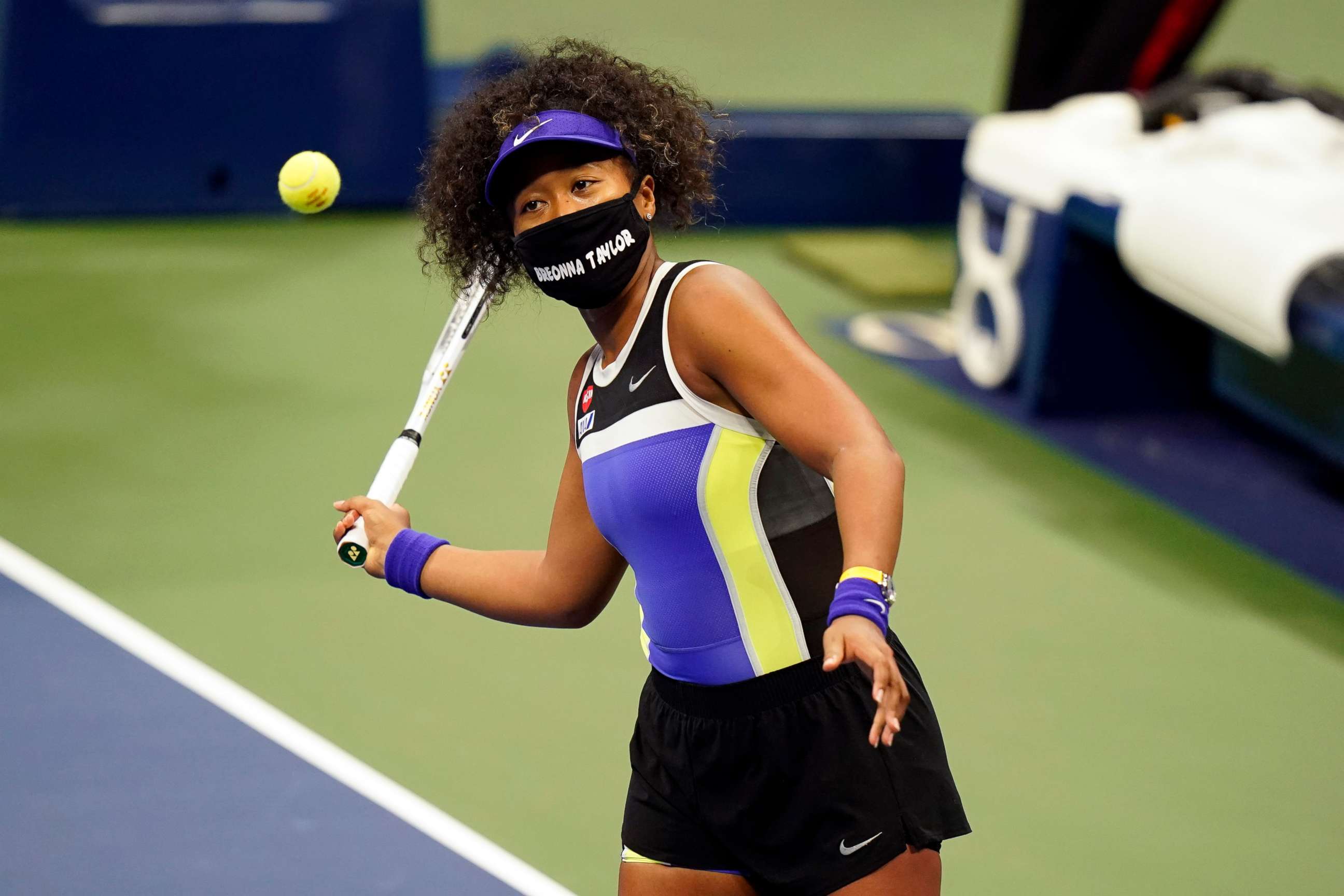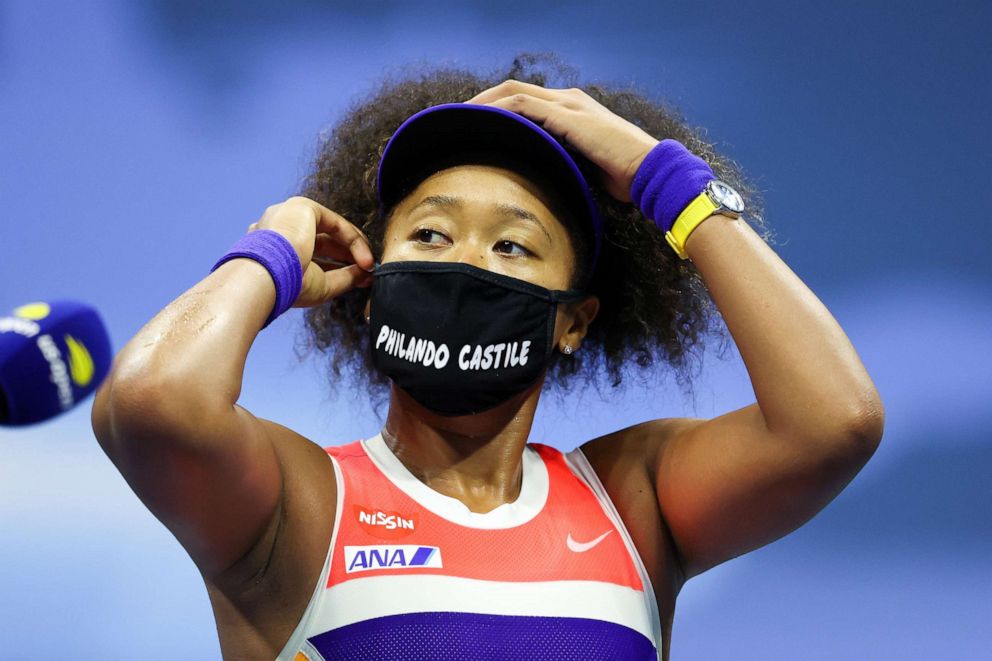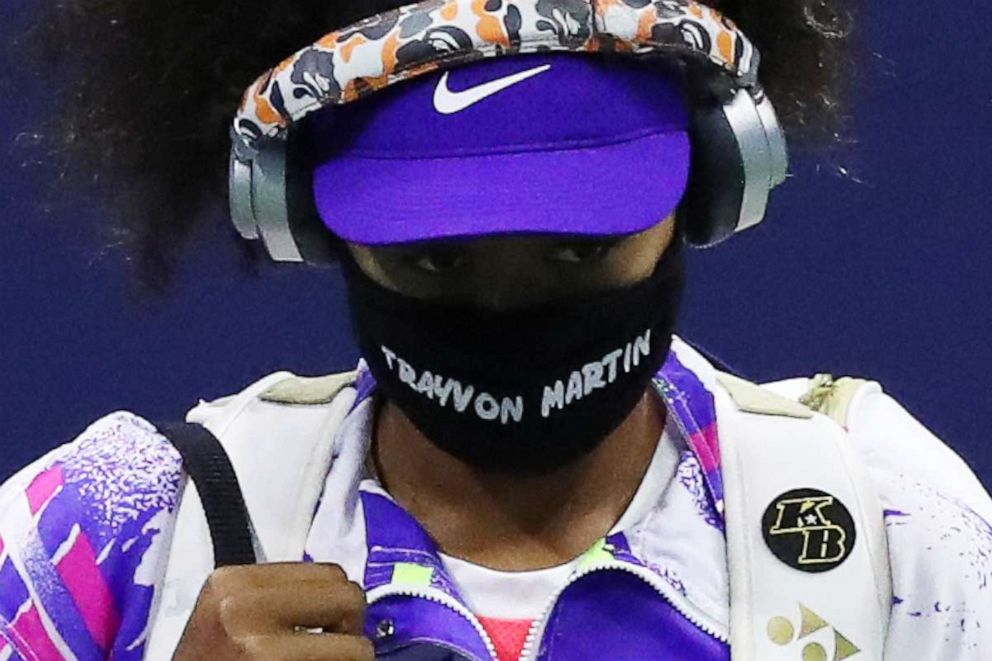How Naomi Osaka is using masks to make statement on one of world's biggest tennis stages
Osaka defeated Victoria Azarenka in Saturday's U.S. Open final.
Naomi Osaka stepped onto the sport's biggest stage with a silent act that reverberated around the world.
Osaka, the 22-year-old tennis prodigy with three majors already to her name, left the bowels of Arthur Ashe Stadium to play in front of nearly 24,000 empty seats and a global television audience -- silently signaling a call to consciousness with the simple cloth mask on her face.
"I'm aware that tennis is watched all over the world, and maybe there is someone that doesn't know Breonna Taylor's story," Naomi Osaka said after winning her first U.S. Open match this year.
Since the start of the tournament, Osaka has walked on the court wearing masks with the names of Black Americans who have died in encounters with police or due to racial injustice.
"I have seven [masks], and it's quite sad that seven masks isn't enough for the amount of names," she said.
Out of countless possibilities, Taylor, Elijah McClain, Ahmaud Arbery, Trayvon Martin, George Floyd and Philando Castile are the six Black men, women and children she highlighted ahead of Saturday’s championship match.
Osaka donned a mask for Tamir Rice, a 12-year-old Cleveland boy who was shot and killed by police while holding a toy gun, ahead of the final. She defeated Victoria Azarenka, 1-6, 6-3, 6-3, to take her third major on Saturday.
"The point is to make people start talking," Osaka said of wearing the masks on court following her win.
Clarence Castile, Philando's uncle, described the moment he saw his nephew's name on her face as electric.
"I had a tingle go through me when I saw Naomi wear Phil's name on her mask," he told ABC News, adding, "She is using her platform to show the things that's been happening and shouldn't."
Castile was fatally shot by a Minnesota police officer in July 2016. The officer was fired from the police force, but later acquitted of manslaughter.

"I feel like I'm a vessel at this point, and in order to spread awareness," Osaka told ESPN, acknowledging the global reach of tennis.
It was fitting that she made such a statement at a stadium named for one of America's most influential tennis players.
"I do think it's incredible that she goes out on Arthur Ashe Stadium and make social statements," former professional tennis player and ESPN commentator James Blake said.
Blake noted that Ashe's impact was not because of his victories on the court, but rather how he used his platform away from tennis.
"He was the most influential because of the stance he took. Because of the fact that he fought against apartheid, because he fought for AIDS rights, because he fought for Haitian rights ... that's why the court is named after him," he said.
"It's a very big motivating factor for me just to try to, like, get the names out to as many people as I can," Osaka told ABC News after her semifinal win.
Blake said the pressure that the tennis player was already facing only heightened after taking a public stance.
"She found something of value more than just tennis because of what she did," he said, adding it "puts more pressure on her tennis, puts more pressure on her sponsors ... she made a huge decision."

Osaka's choice brought a smile to the face of a heartbroken mother on Tuesday night.
"Ahmaud and Mr. Floyd's spirit will live forever and are definitely winning spirits" Wanda Cooper-Jones, Arbery's mother, told ABC News. "I wish I could have thanked her personally for her support also to congratulate her on her big wins. Again, it shows if we all stand together, we will win together."
Arbery was on his daily jog when he was allegedly shot and killed by a father and his adult son in February. Both men, as well as a third, have been charged with murder in the case.
National civil rights attorney Lee Merritt views Osaka's actions as a testament to her character.
"Winning in that arena is difficult enough. Championing these causes, bearing these names, can add to the levity of the moment and cause unwanted distractions," Merritt, who is representing Arbery's family, told ABC News.
He continued, "Naomi's demonstration during the match helps continue to focus international attention on the issues of Black lives."
Attorney Ben Crump, who's represented the families of Martin, Taylor, Floyd, Arbery and others, tweeted congratulations to Osaka after Saturday's final.
The biracial tennis star's turn to on-court activism started before the U.S. Open's fortnight.
As the sports world came to a pause on Aug. 26 following the police shooting of Jacob Blake in Kenosha, Wisconsin, Osaka said she would not play in the Western & Southern Open's semifinal match the following day in solidarity.
"I don't expect anything drastic to happen with me not playing, but if I can get a conversation started in a majority white sport I consider that a step in the right direction," she posted on social media.
After her statement, organizers of the tournament paused play in order to reflect the national temperature. Now, she's become part of the association's social change movement.
"Naomi Osaka is a champion in the truest sense of the word. Her abilities on the tennis court are matched by her willingness to stand up for what she believes in," Stacey Allaster, U.S. Open tournament director and U.S. Tennis Association chief executive, professional tennis, said Friday in a statement to ABC News.
"She has used the spotlight as a platform for activism and awareness, and we applaud her and stand with her in her fight for social justice and equality," she added.

Osaka's newfound voice was not always a part of the champion -- when the world first met her, she was shy, soft-spoken and thrust into one of the most talked-about moments in U.S. Open history.
Osaka's historic win against Serena Williams at the 2018 U.S. Open Final was marred in controversy after Williams received a series of violations that led to a passionate argument between the 23-time grand slam champion and the chair umpire.
Before receiving the championship trophy, her first victory in a major, Osaka sat on court with a towel over her head and was emotional during the ceremony.
After that win, Osaka told ABC News that Williams comforted her and told the younger player -- who grew up watching the tennis icon -- that she was proud of the new champion.
Since then her game has developed as well as her stature as a global tennis star.
Blake, once a top-five player in the world, highlighted how that maturation process for players, who enter the sport at an early age, can impact how they use their platforms.
"When superstars, especially in women's tennis -- they come on the scene so young that they're still maturing," he said. "Naomi Osaka already had pressure at a young age, and she's adding more pressure as she gets older, but now it's brought on; she's doing it herself."
"Honestly, I'm more of a follower than a leader," she said last week. "I like to follow things. I was just waiting and waiting, and then I realized I would have to be the one to take the step."

Castile believes the energy around the movement is helping Osaka in the competition.
"Not only are the names of Philando Castile, George Floyd and others standing behind her, she also has the ancestors' power behind her," he said.
"I just want to say thank you to Naomi Osaka for representing Trayvon Martin on your customized mask," Sybrina Fulton, Martin's mother, said in a taped message that aired on ESPN. "We thank you from the bottom of our hearts, continue to do well, continue to kick butt at the U.S. Open."
The 17-year-old Martin was killed in 2012 during an encounter with George Zimmerman, a Florida neighborhood watch crime captain. Zimmerman was later found not guilty of second-degree murder.
Osaka reacted to the message from Fulton in a tweet, writing, "I tried to hold it in on set but after watching these back I cried so much. The strength and the character both of these parents have is beyond me."
Blake views Osaka's actions as the start of a new generation taking a stand in tennis.
"I think she's growing up. ... I'm proud of her. I'm also proud of the younger generation in general, because it seems like they're open-minded," he said.
At the moment, Osaka said she does not plan on continuing these types of social justice statements, but she noted that they are actions that cannot be planned out.
"For me, I feel like I'm just doing what I think I'm emotionally capable to do. I felt like this was right for me at this time," Osaka told ABC News on Thursday.
"Naomi is the positive change and hope that world needs right now," Fulton told ABC News. "This issue is bigger than black and white."




